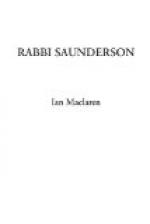Then the pathos of the situation overcame Carmichael, and he went over to the bookcase and leant his head against certain volumes, because they were weighty and would not yield. Next day he noticed that one of them was a Latin Calvin that had travelled over Europe in learned company, and the other a battered copy of Jonathan Edwards that had come from the house of an Ayrshire farmer.
“Forgive me that I have troubled you with the concerns of my soul, John”—the Rabbi could only stand with an effort—“they ought to be between a man and his God. There is another work laid to my hand for which there is no power in me now. During the night I shall ask whether the cup may not pass from me, but if not, the will of God be done.”
Carmichael slept but little, and every time he woke the thought was heavy upon him that on the other side of a narrow wall the holiest man he knew was wrestling in darkness of soul, and that he had added to the bitterness of the agony.
THE WOUNDS OF A FRIEND
Winter has certain mornings which redeem weeks of misconduct, when the hoar frost during the night has resilvered every branch and braced the snow upon the ground, and the sun rises in ruddy strength and drives out of sight every cloud and mist, and moves all day through an expanse of unbroken blue, and is reflected from the dazzling whiteness of the earth as from a mirror. Such a sight calls a man from sleep with authority, and makes his blood tingle, and puts new heart in him, and banishes the troubles of the night. Other mornings Winter joins in the conspiracy of principalities and powers to daunt and crush the human soul. No sun is to be seen, and the grey atmosphere casts down the heart, the wind moans and whistles in fitful gusts, the black clouds hang low in threatening masses, now and again a flake of snow drifts in the wind. A storm is near at hand, not the thunder-shower of summer, with its warm rain and the kindly sun ever in ambush, but dark and blinding snow, through which even a game-keeper cannot see six yards, and in which weary travellers lie down to rest and die.
The melancholy of this kind of day had fallen on Saunderson, whose face was ashen, and who held Carmichael’s hand with such anxious affection that it was impossible to inquire how he had slept, and it would have been a banalite to remark upon the weather. After the Rabbi had been compelled to swallow a cup of milk by way of breakfast, it was evident that he was ready for speech.
“What is it, Rabbi?” as soon as they were again settled in the study. “If you did not . . . like my sermon, tell me at once. You know that I am one of your boys, and you ought to . . . help me.” Perhaps it was inseparable from his youth, with its buoyancy and self-satisfaction, and his training in a college whose members only knew by rumour of the existence of other places of theological




